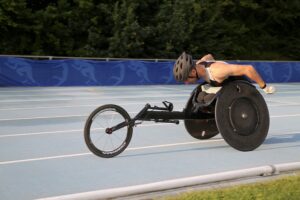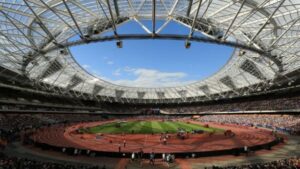Your basket is currently empty!
Does Paralympic Sport Benefit the Right Athletes? Part 2 of 2.
Start with Part 1 of Does Paralympic Sport Benefit the Right Athletes.
A Shift in Recruitment of Athletes
Part 1 of this article mostly talked about classification within Para sport. In part 2, I focus more on trends within the International Paralympic Committee (IPC) in relation to medal event and athlete selection. I will be more critical of the IPC in this part.
I have noticed a shift recently towards sports finding people with minor impairments who are already playing alongside able bodied competitors and didn’t previously consider themselves “disabled” and recruiting them into para sport. Much as I fully welcome inclusion, it seems like much more of this has been happening recently and I don’t think it is the direction we should be going in. Many sports seem more intent on finding people with very minor disabilities, who are currently quite happy being involved in the sports they were already managing to take part in, and making them great Paralympians. These people are already involved in sport and are active and healthy because of it. Whereas, what I think should be happening is that the people who are currently struggling to take part in sport due to their disability are encouraged to participate and have opportunity to compete to a high level if they decide to and show the ability to do so. Much as there is value in elevating those with minor impairment to compete with others in similar positions, its main purpose is often skewed more at winning medals and therefore funding for national squads. I don’t want to single out particular sports but as an example from a British para rowing recruiting video from a few years ago it did actually say words to the effect of “you may only have a slight impairment or not consider yourself disabled but you may still qualify for para rowing”. I completely see why this needs to be said as GB rowing wants to win lots of medals, as do other sports. However, I am concerned as there are a limited number of sports and events at any Paralympic games. There are some sports and events that are for athletes with very minimal disabilities or impairments that many would argue are taking away possible events for those with more severe disabilities, who are just simply not able to compete at all if their events are not included. Some impairments allow athletes to compete very easily with their able bodied counterparts and tough as the question may be, we need to ask if these sports should actually be included in a paralympic games?
I am not an expert, and I understand this directly affects some athletes currently competing, which sounds like I am being unfair to them. However, in my mind if you have, for example, a minor upper limb amputation or your eye sight is affected but you can still see the lines on the track, you can still compete with able bodied runners (particularly over long distance), throw a javelin with a non affected hand, or do the long jump. These athletes who are much less affected by their disabilities do often produce events that can look visually more exciting. The athletes look more like the stereotypical view of an able bodied Olympian. They are often much easier to sell to the media. Their bodies and the way they move are more similar to what an untrained able bodied viewer would be used to seeing in athletic competition. But, those with a greater degree of impairment train just as hard, struggle to overcome the odds just as much and deserve as much, if not more, opportunity to demonstrate to the world their physical prowess in competition as anyone else. As new sports and new events fight their way into para sport and the Paralympic games, are we allowing too many sports and events for those with minor impairment? At every games there are limits to the amount of medals events on offer and when a sport or event is added it doesn’t mean there are more events, it mostly means that some others get pushed out. Inclusion is great but when inclusion for those with minor impairment means fewer events for those with more significant impairment, that actually becomes exclusion! That exclusion is also at the expense of those who should benefit from inclusion the most.
How I’ve Been Impacted
I have experience of how this has affected me personally as an athlete. I began wheelchair racing just after the Beijing Paralympics in 2008. At that games my T52 category had, I think, 3 track events (2 sprints and a middle distance event) and a marathon that medals could be won in. I have always been a longer distance athlete both pre accident and after it as a wheelchair athlete, so at least I had some events to aim at. By the London games the marathon had gone but I think there were 3 track events including one middle distance. In Rio and Tokyo there were track events in 100m, 400m and 1500m. By the Paris games, the 1500m had gone too, leaving only sprint events. This has been really disappointing for me, giving me nothing left to aim for and making me pretty frustrated with the IPC. It has been the reason I have pretty much stopped attending track races and instead focused on long distance road races that are nothing to do with the IPC. The thing that really gets me angry about the situation is that if you ask the IPC why there is no long distance T52 race they will reply that there is one. Officially the Paralympic marathon road race is open to classifications T52, T53 and T54 to compete together. So on the surface their statistics will say that they are still including this as a higher impairment event. This is the bit that gets me angry. What isn’t shown in that statistic, is that the minimum qualifying standard for any athlete to get selected for the Paralympic marathon is 1 hour 35 minutes. However, the T52 world marathon record is 1 hour 40 minutes! Therefore, to even be considered for selection (and in reality you would be unlikely to get selection with the minimum time anyway) a T52 athlete would have to break the world record by over 5 minutes! That’s just an insult to all T52 racers disguised within the fine detail of seemingly reasonable event changes.
National Body Selection of Athletes Dilemmas
There is an understandable temptation for national sporting bodies to pick less disabled medal hopes over equally likely medal hope but more disabled athletes. It is unfortunate but true that it is easier and more cost effective to transport and accommodate the needs of someone with a minor disability than someone with a more severe disability. I believe that there are times when the full support they need is not given to athletes with higher disabilities levels because of cost implications. I believe this may be happening in developed countries national bodies, when money is less of an issue, so is much more likely to be happening in countries where finances available to fund para sport is much smaller. If you base funding on medals, and you have limited resources to get those medals, economics dictates you will spend those resources on the cheaper way to get medals. If there is equal opportunity for medals between two athletes, the “less disabled” athlete is the easier and cheaper one to select for the same medal opportunity. This sadly can be a more tempting prospect for National selectors. But when this happens, it is at the expense of individual athletes with severe disabilities and of the sports originally designed with them in mind. I’m also concerned at the trend towards lack of disability being what coaches are looking for rather than talent, ability and determination.
Do We Need a Change In Emphasis?
It all seems to point towards national bodies scouting for the least disabled in a classification (which will always happen) but also the least effort in converting someone already competing in a sport, not realising their minor disability allowed them to be eligible, over helping someone who has a more severe disability but could be a great athlete to progress to international level in their sport. It now often seems a bit like the “nearly able” are taking over Paralympic sport while the less able struggle to even have events to compete in.
I don’t believe it is a deliberate change of direction by the Paralympics but more of a slow slide in that direction. The Paralympics has been an awesome movement for positive change in the lives of disabled people, but I think we need to be aware of this slide and evaluate if it is helping to do what the Paralympics was initially set up to do. Is it helping to motivate and inspire to get active, those it was set up to help? If it is not being as effective at this as it should be, do we need to make some changes, as difficult as that may be, to redress that balance? The success of the Paralympic movement itself should not be underestimated but has this success ultimately distracted us from its original aims?
Rob Smith,
Wheelchair racer and disability sport athlete,
CEO at the Active Hands Company.



